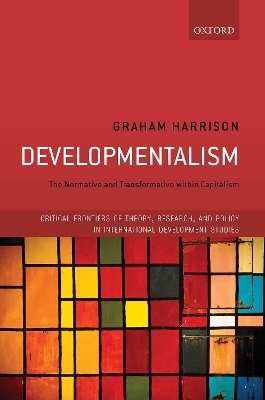
Developmentalism
The Normative and Transformative within Capitalism
Seiten
2020
Oxford University Press (Verlag)
978-0-19-878579-8 (ISBN)
Oxford University Press (Verlag)
978-0-19-878579-8 (ISBN)
Developmentalism uses 250 years of case studies to show the deep contextualization of capitalist transformation, as well as the massive improvements in material life that is has generated.
Why do so few countries achieve development success? Achieving development requires many changes over a short period of time, generating instability and risk. It is a deep and integrated economy of change involving force, strategic thinking, and ideological conviction - it emerges when successful development is seen as necessary for the survival of a political order. Developmentalism engages with the moral issues that this raises.
Developmentalism: The Normative and Transformative within Capitalism uses a historical comparative approach to understand development as a transformation which involves a deep and integrated political economy of change - a shift from a state of 'capital-ascendance' to 'capital dominance'. It is only through a transformation towards capital dominance that mass poverty reduction and the construction of a commonwealth are possible. However, capitalist development is extremely difficult and requires a highly exacting political endeavour. The politics of development is conceptualized as developmentalism: a strategy and ideology in which governments exercise heavy directive power, endure instability and crisis, and secure a rudimentary legitimacy for their efforts. This book argues that developmentalism requires a conflation of successful capitalist transformation with some form of existential insecurity of the state itself. It flourishes when capitalist transformation connects to profound questions of sovereignty, statehood, nation-building, and elite survival. Developmentalism shows deep contextualisation of capitalist transformation as well as the massive improvements in material life that it has generated.
Why do so few countries achieve development success? Achieving development requires many changes over a short period of time, generating instability and risk. It is a deep and integrated economy of change involving force, strategic thinking, and ideological conviction - it emerges when successful development is seen as necessary for the survival of a political order. Developmentalism engages with the moral issues that this raises.
Developmentalism: The Normative and Transformative within Capitalism uses a historical comparative approach to understand development as a transformation which involves a deep and integrated political economy of change - a shift from a state of 'capital-ascendance' to 'capital dominance'. It is only through a transformation towards capital dominance that mass poverty reduction and the construction of a commonwealth are possible. However, capitalist development is extremely difficult and requires a highly exacting political endeavour. The politics of development is conceptualized as developmentalism: a strategy and ideology in which governments exercise heavy directive power, endure instability and crisis, and secure a rudimentary legitimacy for their efforts. This book argues that developmentalism requires a conflation of successful capitalist transformation with some form of existential insecurity of the state itself. It flourishes when capitalist transformation connects to profound questions of sovereignty, statehood, nation-building, and elite survival. Developmentalism shows deep contextualisation of capitalist transformation as well as the massive improvements in material life that it has generated.
Graham Harrison is Associate Professor of Political Economy at the School of Government and International Affairs, Durham University. His research interests have focused on East African development, especially in relation to governance and agricultural development. He has also written on corruption, humanitarian intervention, the World Bank, international development campaigning, and neoliberalism.
Section I: Developmentalism as a Political Theory of Transformation
1: Introduction
2: Capitalist Development
3: The Capabilities Approach and Liberalism
4: Realism and Political Economy
Section II: Case Studies
5: Britain
6: America
7: The Post-Imperial Era and Japan
8: Taiwan and Israel
9: Rwanda and China
10: Conclusion
| Erscheinungsdatum | 21.08.2020 |
|---|---|
| Reihe/Serie | Critical Frontiers of Theory, Research, and Policy in International Development Studies |
| Verlagsort | Oxford |
| Sprache | englisch |
| Maße | 163 x 241 mm |
| Gewicht | 622 g |
| Themenwelt | Wirtschaft ► Volkswirtschaftslehre ► Makroökonomie |
| Wirtschaft ► Volkswirtschaftslehre ► Wirtschaftspolitik | |
| ISBN-10 | 0-19-878579-8 / 0198785798 |
| ISBN-13 | 978-0-19-878579-8 / 9780198785798 |
| Zustand | Neuware |
| Haben Sie eine Frage zum Produkt? |
Mehr entdecken
aus dem Bereich
aus dem Bereich
Volkswirtschaftslehre für eine sich ändernde Welt
Buch | Hardcover (2024)
De Gruyter Oldenbourg (Verlag)
CHF 62,90
Kompakt und prüfungsrelevant für Wirtschaftswissenschaftler
Buch | Softcover (2021)
Vahlen, Franz (Verlag)
CHF 16,65
Makroökonomie, Wirtschaftspolitik und nachhaltige Entwicklung
Buch | Hardcover (2022)
Vahlen (Verlag)
CHF 69,70


